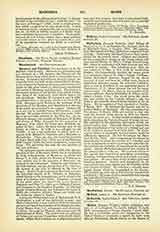

MacCaghwell (CAVELLUS), HUGH, archbishop and theologian, b. at Saul, Co. Down, 1571; d. September 22, 1626. He received his earliest education in his native place and then passed to a famous school in the Isle of Man. On his return to Ireland he was selected by Hugh, Prince of Tyrone, as tutor to his sons Henry and Hugh. He was sent by the prince as special messenger to the Court of Spain to solicit aid for the Ulster forces. During his stay at Salamanca, where the Court then resided, he frequented the schools of the university and took doctor’s degrees in divinity. Soon afterwards he gave up all worldly greatness to enter the Franciscan order. He enjoyed a great reputation as a theologian, and his commentaries on John Duns Scotus were held in high repute. Vernulaeus says that he was conspicuous for his virtues and that his holiness of life and profound learning made him the miracle of his time. It was principally due to his great influence at the Spanish Court that the Irish Franciscan College of St. Anthony was founded at Louvain. After his entry into the order, Hugh taught for some time in the University of Salamanca, then he was appointed superior and lecturer at St. Anthony’s, Louvain. Among his pupils were John Colgan, Patrick Fleming, Hugh Ward, Anthony Hickey, etc. He was summoned to Rome to lecture in the convent of Aracceli; but his energies were not limited to his work as professor. He was employed by the pope on several commissions. He gave substantial help to Father Luke Wadding in founding and developing St. Isidore’s and the Ludovisi colleges for Irish students. On March 17, 1626, Urban VIII, passing over all the other candidates, nominated Hugh MacCaghwell Archbishop of Armagh and Primate of all Ireland; the consecration took place on June 7, in the church of St. Isidore. Thomas Walsh, Archbishop of Cashel, was consecrated at the same time. The consecrating prelate was Gabriel, Cardinal de Trejo, a great friend of the Irish. His health had been much weakened by his manifold duties and the great austerities he practiced. In making the visitations of the provinces of the order he always traveled on foot, and passed much time in prayer and fasting. While making preparation for his departure for his arduous mission he was seized with fever and died. He was buried in the church of St. Isidore, and his friend Don John O’Neill, Earl of Tyrone, had a monument placed over his grave. Nicolaus Vernulaeus delivered an oration before the university commemorating the virtues and learning of the archbishop; which was published at Cologne, 1657.
MacCaghwell’s principal works are: “Scoti Commentaria in quatuor libros Sententiarum”, 2 vols., folio, Antwerp, 1620 (to this work is prefixed a life of Scotus); “Scoti Commentaria seu Reportata Parisiensia””Quaestiones quodlibetales”; “Quaestiones in libros de anima”; “Quaestiones in metaphysicam”; etc. He also wrote a work in Irish, which was printed at the Irish press in the college of St. Anthony, Louvain, in 1618, entitled “Scathain sacramunthe na Aithrighe”, that is, “The Mirror of the Sacrament of Penance“.
GREGORY CLEARY

